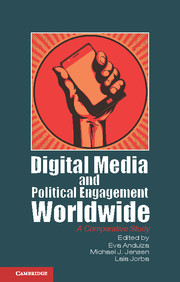Book contents
- Frontmatter
- Contents
- List of Tables and Figures
- Contributors
- Acknowledgments
- Introduction
- 1 The Impact of Digital Media on Citizenship from a Global Perspective
- 2 Recent Shifts in the Relationship between the Internet and Democratic Engagement in Britain and the United States
- 3 Political Engagement and the Internet in the 2008 U.S. Presidential Elections
- 4 Online Political Participation in the United States and Spain
- 5 Internet Use and Political Attitudes in Europe
- 6 Digital Media and Offline Political Participation in Spain
- 7 Online Participation in Italy
- 8 On the Causal Nature of the Relationship between Internet Access and Political Engagement
- 9 The Uses of Digital Media for Contentious Politics in Latin America
- 10 Opening Closed Regimes
- 11 Digital Media and Political Attitudes in China
- Conclusion
- References
- Index
3 - Political Engagement and the Internet in the 2008 U.S. Presidential Elections
A Panel Survey
Published online by Cambridge University Press: 05 July 2012
- Frontmatter
- Contents
- List of Tables and Figures
- Contributors
- Acknowledgments
- Introduction
- 1 The Impact of Digital Media on Citizenship from a Global Perspective
- 2 Recent Shifts in the Relationship between the Internet and Democratic Engagement in Britain and the United States
- 3 Political Engagement and the Internet in the 2008 U.S. Presidential Elections
- 4 Online Political Participation in the United States and Spain
- 5 Internet Use and Political Attitudes in Europe
- 6 Digital Media and Offline Political Participation in Spain
- 7 Online Participation in Italy
- 8 On the Causal Nature of the Relationship between Internet Access and Political Engagement
- 9 The Uses of Digital Media for Contentious Politics in Latin America
- 10 Opening Closed Regimes
- 11 Digital Media and Political Attitudes in China
- Conclusion
- References
- Index
Summary
Introduction
In the run-up to the 2008 U.S. presidential election, the media buzz about online mobilization was palpable. Expectations were set high. Following in the footsteps of Howard Dean in the 2004 presidential election, President Barack Obama raised $600 million, much of it from small online donations by individuals (Luo 2008). Without question, the internet is an integral part of politics in the twenty-first century, as America quickly has become a nation of digital citizens (Mossberger, Tolbert, and McNeal 2008) residing in a digital public sphere (Howard 2005). During the 2008 presidential election, 55 percent of the U.S. adult population used the internet for some type of political activity, ranging from looking up information on candidates to reading political blogs, watching YouTube videos, and using candidates’ websites (Smith 2009). There is a growing body of research demonstrating that internet use can increase political participation and is associated with higher levels of voting and participation in election campaigns (Bimber 2003; Tolbert and McNeal 2003; Krueger 2002, 2006; Mossberger et al. 2008). But is online politics engaging new participants, or is it only expanding activity among those who are already interested and active, as many scholars have found (Norris 1999b; Margolis and Resnick 2000; Prior 2005)? If the latter is the case, online politics may be increasing the gap between the informed and the uninformed.
Most previous research has relied on cross-sectional survey data that do not allow us to measure how change in use of the internet for politics is associated with change in civic engagement and traditional political participation, such as voting over the course of a single campaign season. One recent study provides a meta-analysis of the current work on the internet's effect on engagement (Boulianne 2009). Results show that the internet's effect is nonnegative. However, the meta-analysis itself draws on studies using cross-sectional survey data. Using a unique six-wave panel survey from the 2008 U.S. presidential elections that includes a national sample of twenty thousand registered voters from before the presidential primaries through the general election, we measure who changed their level of online political engagement and how it affected political interest, as well as traditional (offline) political behavior and voter turnout.
- Type
- Chapter
- Information
- Digital Media and Political Engagement WorldwideA Comparative Study, pp. 56 - 79Publisher: Cambridge University PressPrint publication year: 2012
- 8
- Cited by



